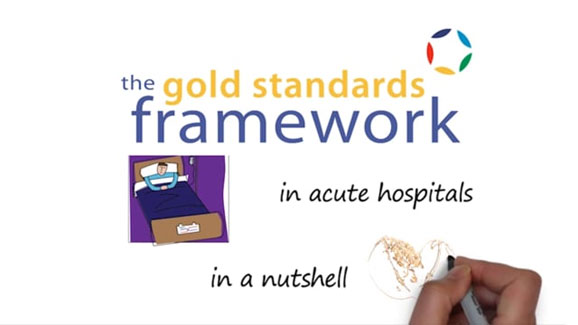Navigation

Welcome to the Hospitals Training Programme
The Gold Standards Framework Training programmes are recognised by British Geriatrics Society, Care Quality Commission, General Medical Council, Royal College of Surgeons, for providing quality end of life care.
The GSF Hospital Training Programme is a very successful, evidence-based service improvement programme in End of Life Care. The programme was introduced in 2008, building on the use of GSF in the community since 2000 and now involves many Acute, Community and Mental Health hospitals. The key aim of the training programme is simple - improve end of life care for all people. In order to do that we need to identify our population - 30% at any one time in an acute hospital environment, assess their needs both clinically and personally and plan their care in alignment with their wishes and preferences. GSF will enable you to proactively identify and support your patients and the benefits will not only be felt by the patients but their carers and staff. Improving End of Life Care in hospitals is recognised as being crucial to enhancing care for the wider population and instrumental in developing a compassionate culture within an organisation. With proactive planning there will be better quality of care for patients, a reduction in re-admissions and reduced hospital bed days, with more patients enabled to die at home if that is their preferred place of care.
GSF helps you implement national policy into practice. The training programme is in alignment with NHS England’s 2019 Long Term Plan, the Universal Personalised Care guidance and NICE Guidance for end of life care for adults, care in the final days and Service Delivery and Ambitions for palliative care and end of life care.
Section 1.42 of the Long Term Plan states that “…the NHS will personalise care, to improve end of life care. By rolling out training to help staff identify and support relevant patients, we will introduce proactive and personalised care planning for everyone identified as being in their last year of life.”
The GSF Accreditation Quality Hallmark Award is nationally recognised as a kite-mark for quality, co badged with the British Geriatrics Society and the Community Hospitals Association. The hospital accreditation process is the only approved CQC Information Source for End of Life care inspection for acute and community hospitals. We are proud of our accredited Acute, Community hospitals and Mental Health units. We now have wards that have received the Platinum Award for achieving re-accreditation three years on!
GSF can be part of the solution for your hospital - change the culture and improve your CQC ratings in EOLC.
“Implementation of GSF is encouraging a systematic approach to recognising those patients in hospital who might be in their last year of life, leading to more proactive care and opportunities for people to consider and express their wishes and preferences.” Dr Clare Marlow, Consultant in Palliative Medicine, Wolverhampton Hospital
|
The training includes:
|
|
There are three different ways to access the programme:
|
|
The Accreditation Process There are four parts to the process:
|
International Journal of Palliative Nursing - April 2022 Vol 28, No 4 - The Gold Standards Framework Hospital programme: implementation and progress
GSF Frontrunners in Hospitals - See case studies and examples from GSF Accredited hospital wards demonstrating what is possible to achieve and the considerable progress made.
Poster Summary of Hospital Programme - A useful summary poster used at EAPC Conferences, describing the aims, methods, outcomes and impact of the GSF Hospitals Programme.
"I think the biggest change has been the culture change...it’s about getting patients and their families to take ownership of their care. GSF is the framework that allows us to make that happen. The best bit is making sure that patients receive the care they want, where they want it, when and how they want it and the satisfaction they and we get from that." Dr Kumar, Stroke Consultant at Royal Lancaster Infirmary
"GSF has helped bring the team together in a way none of us had expected. Everyone, including the domestic staff feel engaged and have come up with brilliant ideas for how we can deliver even better care." Dr Elisabeth Bjorndal, Palliative Care Consultant at the Margaret Centre at Whipps Cross Hospital.
"I’m really proud of both our teams for achieving this. It’s been a lot of hard work, especially when they have a lot of competing priorities. The most important thing about identifying patients who are nearing the end of their lives is that it gives them more choice and control over their own care." Heather Wright, Palliative Care team leader



